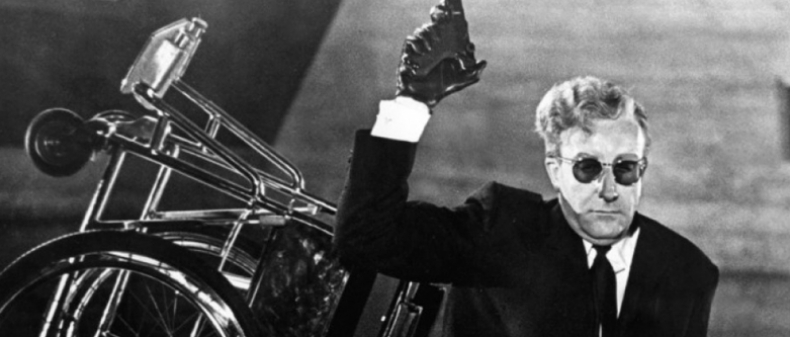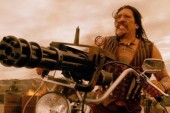
Stanley Kubrick is a film icon spoken of in hushed tones and with such reverence, as if, somehow, he’s still listening. He’s remembered for many things: as one of the few filmmakers awarded complete artistic freedom throughout his career, a perfectionist known for doing hundreds of takes of someone walking down a street, a technical pioneer constantly breaking new ground, an intellectual who forced complex ideas into popular entertainment, and quite simply as one of the greatest filmmakers who ever lived. However, one thing he never quite gets enough credit for is being friggin’ hilarious.
It’s easy to understand why; humor and wit aren’t exactly qualities that fit into the romantic vision of Kubrick as a reclusive eccentric locked away in a mansion who only leaves to make a masterpiece every five years or so. Yet, there’s so much humour throughout his filmography from the perverse character comedy that made Lolita palatable in a repressive era of censorship, to the hysterical satire of A Clockwork Orange, the sly dark humor hidden throughout The Shining and Barry Lyndon, or the endless stream of delightfully quotable obscenities spat out of R. Lee Ermey’s mouth in Full Metal Jacket. Much of Kubrick’s work is secretly hilarious, yet only one of his films is officially a comedy: Dr. Strangelove. Granted it’s one of the film comedy greats and the very fact that the only official Kubrick comedy is also his film about a very plausible nuclear apocalypse probably tickled good ol’ Stan quite a bit.
These days, it can be easy to forget just how audacious it was to find humor in nuclear conflict back in 1964. The Cuban Missile Crisis was only a few years old, the JFK assassination was only a few months old, and the relationship between the U.S. and other countries wasn’t exactly cozy. Kubrick didn’t even start off the project thinking of it as a comedy. He started with a straight adaptation of Peter George’s novel Red Alert about an insane general who launches a personal nuclear attack against Russia and cuts off contact with the U.S. so they can’t prevent the start of World War 3. Yet, as he wrote scenes about generals and the president panicking about not being able to stop the attack, Kubrick couldn’t help but get the giggles (he was an odd man, don’t judge).
At the time, the director famously stated that if a general finds out about a nuclear attack in his living room it’s a drama, but he finds out in the bathroom, it’s a comedy. That’s probably the worst joke he wrote during the Strangelove era, but it did become Kubrick’s modus operundi on the project, crafting a vicious satire about a frighteningly believable situation that could lead to the end of the world. To help him crank out jokes about a global tragedy he hired Terry Southern, a underground counterculture writer and humorist (when such a thing existed… Sigh) and contemporary of Hunter S. Thompson, who took a few less drugs. Southern loved tearing town the establishment even more than Kubrick, and had a quick wit to match the director’s mastery of visuals and narrative structure. They never worked together again, but it was a perfect partnership for the time.
It’s miraculous that such a film ever got financing from a major studio. That was just the power Kubrick wielded in Hollywood and also a testament to Peter Sellers’ swinging 60s star power. The studio were so confused as to how the last Kubrick/Sellers collaboration Lolita became a hit that they convinced themselves it was the novelty of Sellers playing multiple roles and agreed to finance Dr. Strangelove only the condition that Sellers would repeat the trick in the apocalyptic comedy. He did and of course it was an ingenious artistic decision done for the wrong commercial reasons. Whether playing the award president under pressure, the uptight British officer trying to talk sense into a madman, or the insane titular pseudo-Bond villain sexually obsessed with nuclear weapons, Sellers was incredible. He disappeared into the roles and for the most part played them as actual humans rather than straight comedy types (well, not Strangelove. He’s a cartoon…thank god) without sacrificing laughs.
Sellers was also initially intended to play the cowboy who famously rides the nuke like a bull, but had to pull out after injury. Knowing no comedian could replace him, Kubrick instead went with the real thing in cowboy character actor Slim Pickens. That embodied the non-Sellers casting decisions across the board. Kubrick knew his ideas were so outlandish that they had to be played straight. So Sterling Hayden fully commits to his bodily fluids obsessed general and the lines are even funnier when delivered with such conviction. Then there’s George C. Scott, who plays a violent general like an jealous schoolboy in possibly the funniest performance in the film (certainly his pratfall while trying to trying to convince the president to launch nuclear warheads always gets the biggest laugh).
That mixture of straight and the absurd defines Kubrick’s approach to the film as a whole. The script is packed with impeccably-crafted comedy, yet if you were to play the film with the sound off you’d never know it. Kubrick shot on incredible sets in stark black and white, using disorienting wide angle lenses like a serious drama/thriller of the time. The onscreen violence is never played for laughs, even shot in a handheld war-reporting style decades before Saving Private Ryan. The reason is simple. The Cold War, combat, and the very possibility of a nuclear holocaust are not in any way funny. However, the intense irrational paranoia of the time and the way governments and the military treat war strategy as a game certainly can be viewed that way through the right sick n’ cynical pair of eyes.
As funny as Dr. Strangelove is (and it remains hilarious 40 years later), the point Kubrick makes about the ease with which the whole planet could be reduced to rubble because of petty disagreements or a simple, stupid mistake is deadly serious. As important as that suggestion may be, it’s a pretty cynical view that most people wouldn’t want to spend a Saturday night at the movies exploring. Kubrick was wise enough to realize that as a satire, people might laugh along at though the terrifying ordeal before getting that bitter lump in their throat during his mushroom cloud musical finale. Comedy is generally dismissed as a frivolous genre, but good satire like this can be used to tackle material too dark for an entertaining drama. Sure, it takes an ingenious comedy mind to pull that off, but Kubrick was the right guy for the task. He took his obsessive chess player mind that dreamed up unexplored technical achievements in later works and focused in on finding the right balance between laughs and darkness in possibly the most frighteningly pertinent issue of his time. That’s as difficult to pull off as a writer as it was for the director to pull off believable space travel in 2001: A Space Odyssey. And to think that Stanley Kubrick isn’t really remembered for his comedy mind. I guess that’s what happens when you’re good at everything. Small price to pay, I s’pose.
Dr. Strangelove: Or How I Learned To Stop Working And Love The Bomb will screen at The Revue Cinema on Monday June 18 at 7 p.m.
—
Phil Brown writes about film for Toronto Standard.
For more, follow us on Twitter at @TorontoStandard and subscribe to our newsletter.














